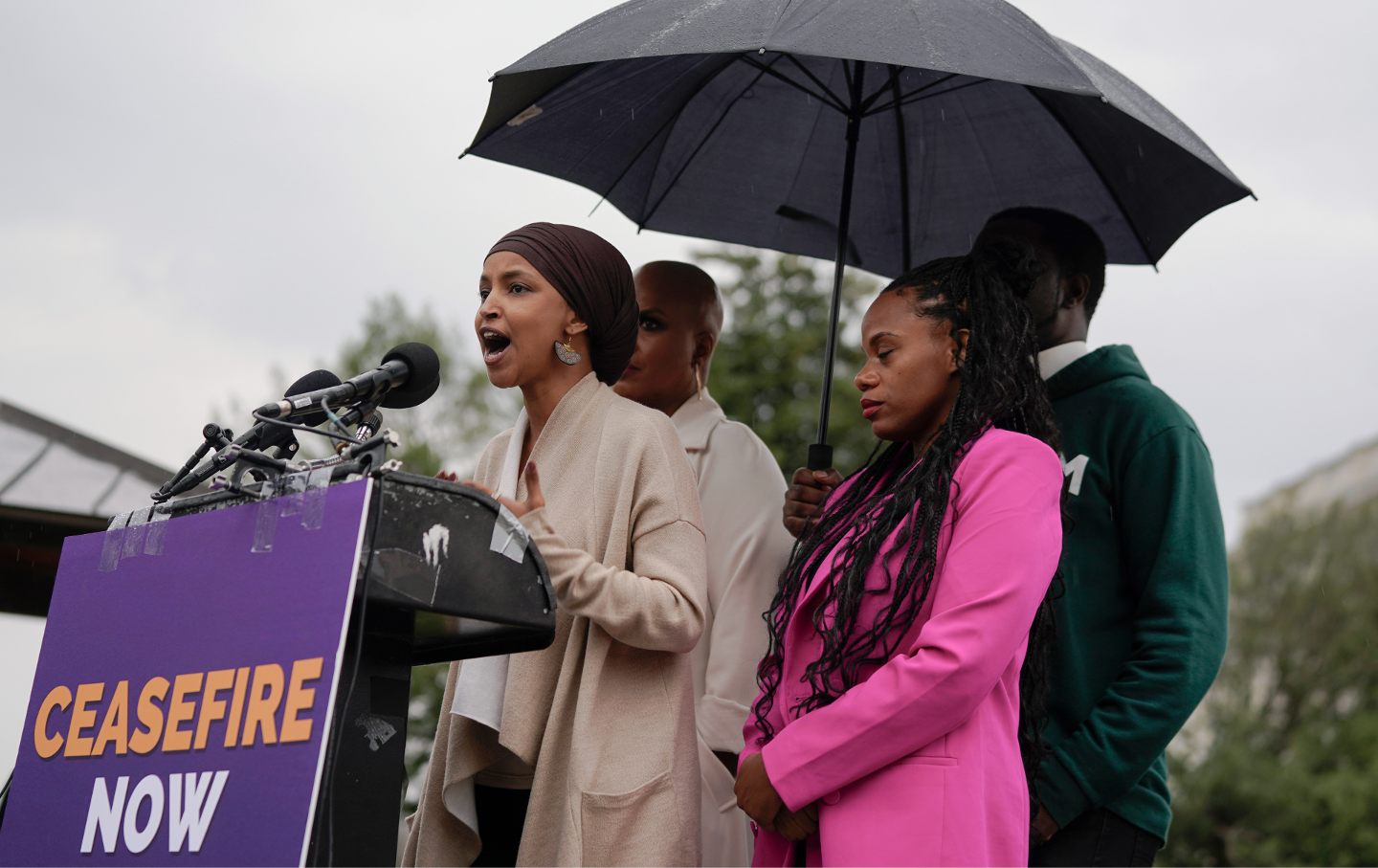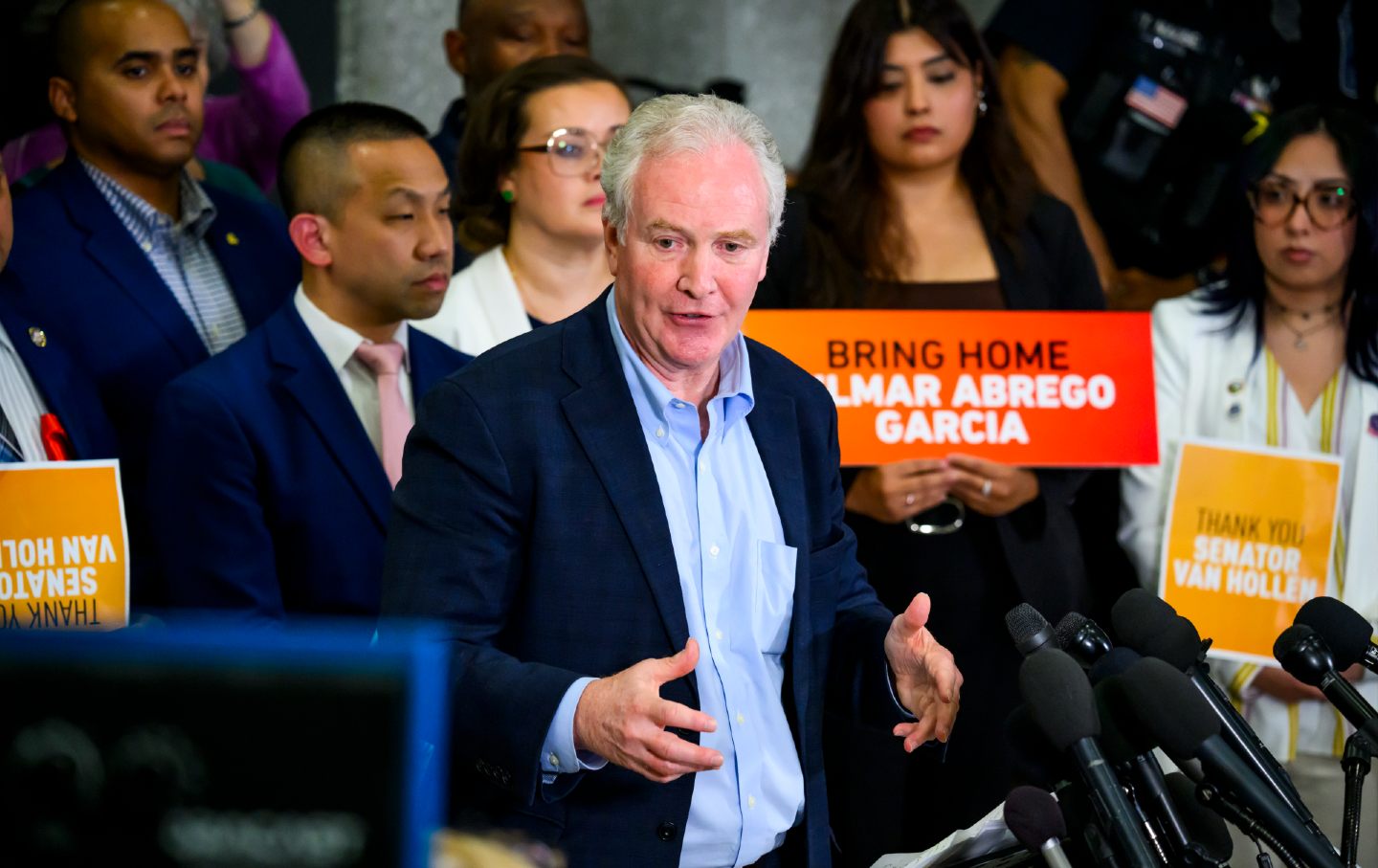Blessed Be the Peacemakers, Unless They Raise Their Voices in Washington
Humanitarian groups propose to stop the killing in Palestine and Israel, but members of Congress who echo their calls are condemned in D.C.

Rep. Ilhan Omar, D-Minn., left, talks during a press conference to call for a ceasefire in Israel and Gaza on Capitol Hill, Friday, Oct. 20, 2023, in Washington.
(Mariam Zuhaib / AP)Little attention is paid by most of the American media and political class to what humanitarian groups working on the ground in Gaza—and their international allies—have to say about ending the death spiral in the Middle East.
But leaders of these groups are speaking with moral clarity about the need to take immediate steps to end the sheer horror that has cost more than 5,500 Israeli and Palestinian lives in the two weeks since the October 7 Hamas assault on Israeli kibbutzim and a music festival.
On October 13, officials with Save the Children International, Oxfam International, Handicap International/Humanity & Inclusion, Plan International, Mercy Corps, the Norwegian Refugee Council, and a number of European affiliates of Médecins du Monde (Doctors of the World) issued a joint statement urging world leaders to demand an immediate cessation of hostilities.
“We plead with world leaders and actors on the ground to prioritize the preservation of human life above all else,” they wrote. “Anything less will forever be a stain on our collective conscience.”
As the week went on, more groups issued calls for an end to the killing, culminating with an October 18 demand by more than 300 religious, peace and development groups—including the American Friends Service Committee, Care International, Christian Aid, Church World Service, the Episcopal Church, Islamic Relief, the Jewish Network for Palestine, Lutheran World Service, and Pax Christi International—for a cease-fire and for “all Heads of State, the UN Security Council, and actors on the ground, to prioritize the preservation of human life above all else.”
A day later, United Nations Secretary General António Guterres called for an “immediate humanitarian ceasefire” in Gaza. “Too many lives—and the fate of the entire region—hang in the balance,” he declared.
Recognizing that reality is not radical.
Yet the world leaders who are in a position to intervene are not responding, even as UN High Commissioner for Human Rights Ravina Shamdasani warns that ”we have grave fears about the toll on civilians in the coming days. Military operations show no signs of abating, the continued siege on Gaza is affecting water supply, food, medicine and other basic needs, and there are daily indications of violations of the laws of war and international human rights law.”
When President Biden traveled to Israel on Wednesday, he did bring a peace plan with him. Instead, the president appeared on the front page of The New York Times, hugging Israeli Prime Minister Bibi Netanyahu next to a headline that read, “U.S. Backs Israel.” Only in a small subhead was it mentioned that Biden has urged “caution” when it came to Israel’s military operations in Gaza.
But asking Netanyahu and his lieutenants to bomb more carefully won’t stop the killing. And, as of Saturday, only a handful of trucks carrying promised humanitarian aid had entered Gaza.
What’s not being heard from Biden and other world leaders is a clear call for an end to the violence along the lines of the one Vermont Senator Bernie Sanders issued Wednesday, when he said, “The bombs and missiles from both sides must end, massive humanitarian aid must be rushed to Gaza, and [the Israeli and international hostages being held by Hamas] must be returned to their families.” (On Friday, Hamas released two American hostages.)
Instead, members of Congress who have amplified messages from humanitarian groups and peace organizations, have been repeatedly attacked. That’s what happened to Rep. Mark Pocan, a Wisconsin Democrat, when he issued a statement this week that said, “I join the many humanitarian groups working in Gaza in calling for an immediate cessation of hostilities towards civilians by all parties in this war. Both the overly broad retaliation of the Israeli government and the continued random missile fires of both Hamas and Islamic Jihad must stop.”
Calling for Hamas to release all hostages, for Israel to allow the delivery of food, water, and medical supplies to Gaza, and for the United States to dramatically increase humanitarian assistance to rebuild Gaza, Pocan concluded, “There is something that clearly links the people of both Israel and Palestine: there are way too many deaths of children that should never have occurred. This must stop, without excuse or hesitation.”
Despite the fact that Pocan’s message closely paralleled the line of the aid groups, it drew a sharp rebuke from the American Israeli Public Affairs Committee, which objected to his observation, “While the violent attack by Hamas on the Israeli people was brutal, it has lessened, and the retaliation by Israel toward Hamas is in full swing.” In social media posts, AIPAC argued that the congressman should “go to Israel and tell that to” victims of the October 7 attack and the families of hostages. The thing is that Pocan’s statements from October 7 onward have decried the Hamas attack and expressed deep sympathy for victims on all sides of the conflict, and that he said, “Any hostages held by Hamas must be released immediately.”
Popular
“swipe left below to view more authors”Swipe →Even though he was aligning himself with humanitarian groups, Pocan wasn’t surprised by the criticism. “AIPAC is there for nothing more than to have Netanyahu’s back,” he said. “Those of us who have been working for peace over many years recognize that we’ve got to have a cessation of hostilities. We’ve got to stop the bombing in order to save lives now and to get people focused—as difficult as that might be—on peace.”
The hits Pocan has been taking are nothing compared to the blistering assault on US Representatives Ilhan Omar (D-Minn.) and Rashida Tlaib (D-Mich.), the only two Muslim women serving in Congress. When White House spokesperson Karine Jean-Pierre was asked last week about statements from Tlaib, Omar, and a handful of other members of Congress raising concerns about mounting Palestinian deaths in Israel’s bombing of Gaza, she labeled the statements “repugnant.” On Thursday, US Representative Marjorie Taylor Greene announced that she would file a censure motion against Tlaib after the Democrat appeared at a Capitol Hill rally organized by Jewish Voice for Peace and IfNotNow activists to declare that “Jewish Grief Must Not Be Used as a Weapon of War” and demand a cease-fire.
At the rally, Tlaib said, “The majority of Americans are literally against oppression. They are. They are against occupation. They are against human rights violations.” There are many signs that she is right. A Data for Progress poll released Friday found that 66 percent of likely voters—80 percent of Democrats, 57 percent of independents, 56 percent of Republicans—agree that the US should call for a cease-fire and de-escalation of violence in Gaza to prevent civilian deaths.
Yet Greene labeled Tlaib, a Palestinian American, “a terrorist sympathizer” and dismissed her as “an Israel hating, America hating woman who does not represent anything America stands for.”
Omar has received similar hatred. She shared voicemails, featuring death threats that referred to her as a “terrorist Muslim,” with NBC. Decrying the “dishonest smear” that suggests criticism of Israel’s treatment of Palestinians should be equated with support for Hamas, Omar said. “It directly endangered my life and that of my family, as well as subjected my staff to traumatic verbal abuse simply for doing their jobs. More importantly, it threatens the millions of American Muslims.”
Tlaib and Omar have joined Missouri Democrat Cori Bush in backing a cease-fire resolution that is supported by 18 House members. Like the calls from humanitarian groups, the resolution details the mounting death toll for Palestinians, Israelis, and Americans and argues that “hundreds of thousands of lives are at imminent risk if a ceasefire is not achieved and humanitarian aid is not delivered without delay.” And, like the calls from humanitarian groups for world leaders to prioritize the preservation of human life, it asks a world leader—President Biden—“to immediately call for and facilitate de-escalation and a cease-fire to urgently end the current violence.”
Hold the powerful to account by supporting The Nation
The chaos and cruelty of the Trump administration reaches new lows each week.
Trump’s catastrophic “Liberation Day” has wreaked havoc on the world economy and set up yet another constitutional crisis at home. Plainclothes officers continue to abduct university students off the streets. So-called “enemy aliens” are flown abroad to a mega prison against the orders of the courts. And Signalgate promises to be the first of many incompetence scandals that expose the brutal violence at the core of the American empire.
At a time when elite universities, powerful law firms, and influential media outlets are capitulating to Trump’s intimidation, The Nation is more determined than ever before to hold the powerful to account.
In just the last month, we’ve published reporting on how Trump outsources his mass deportation agenda to other countries, exposed the administration’s appeal to obscure laws to carry out its repressive agenda, and amplified the voices of brave student activists targeted by universities.
We also continue to tell the stories of those who fight back against Trump and Musk, whether on the streets in growing protest movements, in town halls across the country, or in critical state elections—like Wisconsin’s recent state Supreme Court race—that provide a model for resisting Trumpism and prove that Musk can’t buy our democracy.
This is the journalism that matters in 2025. But we can’t do this without you. As a reader-supported publication, we rely on the support of generous donors. Please, help make our essential independent journalism possible with a donation today.
In solidarity,
The Editors
The Nation








